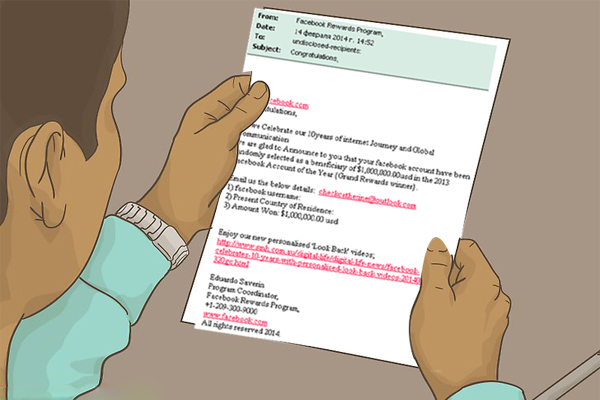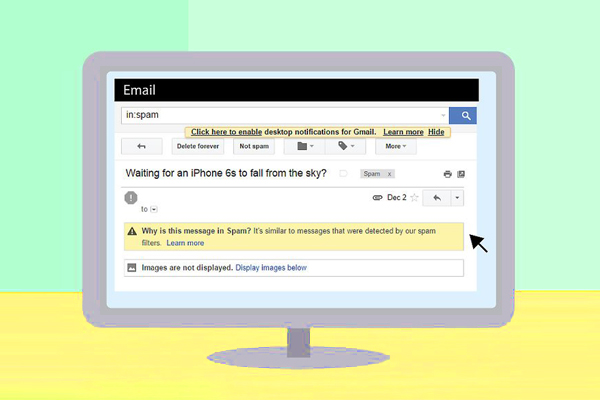Widely known as the Nigerian letter scam, this fraud is a type of advanced fee scheme delivered via unsolicited mail, fax, or email. Although originating from various
global locations, the most prevalent instances are linked to funds in or extracted from West African nations, notably Nigeria. Educational reports, typically disseminated
in presentations and portable document formats, detail workshops and programs conducted by reputable government agencies and organizations to raise public awareness.
The scam unfolds with a letter outlining the writer's need to access a foreign bank account for money transfer, often mentioning sums exceeding US$10 million. The only
requisites are the recipient's bank account details and, for companies, a few blank letterhead pages. In return, the recipient is promised a share in the millions. The
letters often reference political events or disasters, purportedly explaining the origin of the funds. Frequently, the sender claims to be a Prince, a high-ranking
company officer, or a family member of a senior government or military figure from an African state, most commonly Nigeria.
Subject: The former Nigerian dictator, General Sanni Abacha, has passed away, and his widow is seeking assistance to transfer his $80 million fortune out of the
country. This scenario often unfolds in the notorious Nigerian letter scam, where individuals receive unsolicited messages, typically via email, with enticing
propositions that require financial assistance in exchange for a promised substantial reward. In this case, the widow's plea is a classic ploy to lure unsuspecting
victims into a fraudulent financial arrangement. As always, it is crucial to exercise caution and skepticism when encountering such solicitations to avoid falling
victim to scams./div>
» Letter-2
Subject: The son of a deceased Nigerian general claims to need lenders to facilitate the movement of $155 million out of Nigeria. The compensation for this
assistance is unspecified, relying on the assumption that individuals would be willing to undertake the task without expecting anything in return. This narrative
aligns with the typical approach of scams like the Nigerian letter scam, where elaborate stories are crafted to manipulate individuals into providing financial aid
under the guise of a lucrative opportunity. It is crucial to remain vigilant and skeptical of such unsolicited requests to prevent falling prey to fraudulent
schemes.
» Letter-3
Subject: Subject: Mrs. Abacha has returned with a new proposition, offering individuals the chance to receive 30% of $58 million. The question arises: where did
the additional $16 million come from? This scenario follows the pattern of scams like the Nigerian letter scam, introducing enticing financial rewards to lure
individuals into participating. It's important to exercise caution and recognize such unsolicited offers as potential fraudulent schemes, ensuring one doesn't
fall victim to deceptive practices.
» Letter-4
Subject: The son of the late General is eager to secure a portion of his father's wealth, seeking assistance in moving $40 million out of the country. As an enticing incentive,
he promises a 30% share of the total amount. This scenario mirrors the patterns of scams like the Nigerian letter scam, where individuals are enticed with substantial
financial gains. It's crucial to approach such unsolicited propositions with skepticism, recognizing the potential for fraudulent activities and avoiding falling prey
to deceptive schemes.
» Letter-5
Subject: Now, the General's wife seeks a foreign partner to facilitate the transfer of her funds, offering an enticing 20% share of $42 million. This narrative
echoes the persistent nature of scams, with various characters from the same fictional scenario attempting to involve unsuspecting individuals in financial schemes.
It's crucial to remain vigilant and recognize the recurring patterns of such scams to avoid falling victim to fraudulent activities.
Types and Examples of Nigerian Scam Letters:
Donation Solicitation Letters Scam:

Nigerian scammers employ deceptive tactics by sending letters to individuals, requesting donations for purported noble causes, such as fighting against an oppressive
government or supporting critical initiatives in Africa. When recipients express interest in contributing, scammers then directly solicit their bank account details under
the pretext of facilitating a swift and urgent transfer for the intended cause. Unfortunately, well-intentioned individuals seeking to make genuine donations may unwittingly
become victims of this fraudulent donation solicitation scheme originating from Nigeria. Remaining vigilant and skeptical of unsolicited requests is crucial to thwart such
scams.
Nigerian Bogus Cashier Checks :

Another variant of the Nigerian letter scam is the deceptive cashier checks scam. In this scheme, scammers dispatch counterfeit cashier checks or international money
orders to individuals who have advertised products or services online. The checks intentionally exceed the actual cost, and recipients, upon receiving the checks, deposit
them into their accounts. Subsequently, they wire the surplus amount back to the scammer. Unfortunately, before the bank notifies the recipient of the fraudulent nature of
the check, the victims have already transferred the excess funds to the scammer's account, leaving them with no earnings and falling prey to the deceitful tactic. Remaining
cautious and verifying financial transactions is essential to thwart such scams.

Nigerian Funds Assistance Letter Scam :

Chandra Swami, originally known as Nemi Chand and a Jain by religion, is a controversial Indian Tantrik who claims to be a godman. He has faced legal troubles related to
scams conducted in the name of religion. Initially gaining popularity as an astrologer, Chandra Swami later delved into religious practices. Accusations against him included
charges of financial irregularities. In 1996, he was accused of defrauding a London-based businessman of $100,000. In 2011, this religious figure was fined Rs. 9 Crore for
violating the Foreign Exchange Regulation Act. These incidents highlight the legal challenges and controversies surrounding Chandra Swami's activities.
Nigerian Letters with Fake IDs and Links :

Nigerian Letter scammers employ deceptive tactics by directing victims to counterfeit IDs and URLs, creating an illusion of legitimacy. In the provided screenshot, an
example is illustrated where a fabricated lottery win is claimed, urging the user to contact a fraudulent email address. Subsequently, the user receives emails from this
deceptive address, containing links to sham websites. These websites, designed to mimic authenticity, deceive users into providing sensitive information, particularly their
bank account details, leading to scams and financial losses. This underscores the importance of vigilance and caution against falling prey to such elaborate schemes.

Series of Letters from Nigeria :
A recurring characteristic of the Nigerian letter scam is its serial nature, with scammers sending successive letters in an attempt to escalate the apparent compensation
they promise. In each new correspondence, scammers augment the proposed payout, displaying a facade of interest and concern in providing non-existent funds. The content of
these letters undergoes variations in reasons and situations, creating an illusion of legitimacy. The provided screenshot serves as an example of such a series of letters
deployed by scammers, emphasizing the need for vigilance to discern the fraudulent nature of these ongoing schemes.

List of Scammers Convicted in Nigerian Letter Scam:
1) On June 17, 2002, two London residents, George Agbinone and Ovive Ukueku, were apprehended and subsequently sentenced to jail for orchestrating a Nigerian letter
scam. The duo deceived unsuspecting individuals through the infamous "Nigerian Letters" scheme, wherein victims were lured into paying an upfront sum to facilitate a
fictitious fund transfer. This incident underscored the legal consequences faced by those engaged in such fraudulent activities.

2) The assumption that Nigerian scammers exclusively operate from Nigeria was debunked when a gang of Nigerian letter scammers was apprehended in Athens. Greek
police successfully arrested this group involved in perpetrating advance fee payment fraud through scam letters. This incident highlighted the global reach and adaptability
of such fraudulent schemes beyond their presumed geographic origins.

Feel Free to use our Spam Checker Tool
We are providing the
Spam Checker Tool For your convenience, you can input
the email address or contact number you suspect to be a scam into this tool. The system cross-references it with our extensive spam database, providing confirmation on whether
the given email or phone number is legitimate or fraudulent. This verification process helps users identify potential scams and safeguard themselves from deceptive
communications.
Report scam to United States government-you could file a complaint about scam or other crime here.








